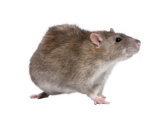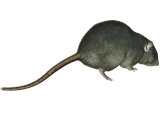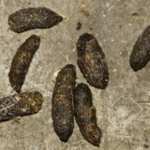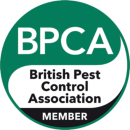
Rat Control in Lincoln and the surrounding area
![]() CALL 01522 306493 TO SPEAK TO A QUALIFIED PEST CONTROLLER
CALL 01522 306493 TO SPEAK TO A QUALIFIED PEST CONTROLLER
We will help you to evaluate your problem and give you quick, honest and TOTALLY FREE advice … without obligation
![]() IF NEEDED, WE ARRANGE A VISIT or ON-SITE SURVEY FOR YOU
IF NEEDED, WE ARRANGE A VISIT or ON-SITE SURVEY FOR YOU
Your local Pest Professional will come round to sort the problem out rapidly and without any fuss
Rats In The UK
In the UK you are most likely to come across the Brown Rat (common or sewer rat) and less so the Black Rat (ship rat). The Black Rat has been with us the longest and has been found in digs in the city of London dating back to the third century. It lives only for about a year, but is sexually active in 2-3 months. Its tail is longer than its body and it’s a very good climber, and can readily enter loft spaces. The slightly bigger and much more common brown rat originated in Asia and was first recorded in Europe only in the 18th century. Its tail is slightly shorter than its body. The brown rat is the one you are likely to come across when looking for rat control in Lincoln. It often lives in the ground and in sewers and drains. Rats are more active at night than in the day. They eat just about anything, and need an easily available source of water. Rats are highly destructive and left unchecked, can cause structural damage to the property. They are also a significant fire threat because of their tendency to gnaw through electrical cables.
The Brown Rat

The brown rat is the most common and largest rat in the UK and commonly lives in sewers.
The Black Rat

The black rat is smaller, darker and sleeker than the brown rat and is commonly found at roof level.
Rats And Disease
Rats really do carry disease, including Salmonella, Listeria, Toxoplasma gondii and Hantavirus. You don’t have to be bitten by one either, as disease and bacteria can be carried in their faeces, urine and saliva. Weil’s Disease for instance, which can be fatal to humans, is carried in rat urine. If any food items have been damaged by rats, they must be thrown away, but always wear a face mask and rubber gloves if clearing up after rats. Rats also carry

parasites, including ticks, lice, mites and fleas. It was of course rat fleas that were responsible for the Great Bubonic Plague of London during 1665 and 1666, which killed over 200,000 people.
What Do Rat Droppings Look Like?
Rat droppings are much bigger than mouse droppings and torpedo shaped – up to an inch in length. Mouse droppings are like small brown grains of rice. Fresh rat droppings will usually be a dark colour.
How Quickly Do Rats Breed?
The common brown rat is sexually mature in only five weeks. If they have a reliable source of food and water, they will breed year round, with a female able to product five litters of 7-12 young in a 12 month period.
How To Get Rid Of Rats
When they are coming into contact with humans, rat control is vital. A fully grown rat is quite a large and un-nerving mammal to come face to face with. Rats carry and spread many nasty diseases and parasites, including fleas and ticks, and rat removal is something that should be left to qualified pest controllers only. If you have a problem with rats and need a rat pest controller in Lincoln and the surrounding area, we can offer expert and friendly advice, rapid service and competitive rates.
When considering how to get rid of rats in the house and rats in the garden, it’s important to understand their behaviour. What rats are looking for is a reliable and regular source of food and water. If they can find this they will look to nest nearby and raise young. Rats are excellent climbers, and can readily go up walls. You have heard the phrase ‘like a rat up a drainpipe’. If they can get in, houses give them excellent shelter to raise their young, and if you get rats in your loft space, the insulation there gives them prime nesting materials. If they get in, you also commonly get rats in wall cavities, or between floors.
The most effective rat control involves evaluating why they are coming out into the open, taking advantage of that behaviour by placing professional strength rat poison (rodenticide) in their path, and then, and only once they have taken the bait, looking at rat proofing measures to try and prevent a re-occurrence. Proofing to stop rats coming in is included withing the price within reason, but can only be done AFTER we have bait take up and have dealt with the issue.
Rats In The Home
It’s important to understand that with any rat infestation, proofing to try and stop them getting in before you have dealt with the rat problem is a waste of time. Rats are professional gnawers, and very destructive. They have to gnaw away at tough items to keep their teeth from over-growing.
If there are rats in the house it’s because they have a food source inside. Or they have an external food source and are using your house to raise young. In either case, if you block their path, they will simply gnaw another way in to get to it, causing more damage. So it’s vital to kill rats first, and then look at rat proofing measures later.
While are evaluating the best way to get rid of rats, we need YOUR help during the rat treatment period, which commonly involves two or three visits, about a week to ten days apart from each other. When evaluating how to get rid of rats from your home, we will need to establish if you have any idea what’s attracting them in (it will be food related) and how they are getting in (often, but not always, where pipework is entering the house). Getting rid of rats involves not only placing the correct bait in their path, but also cutting out the food source. To get the required bait take-up and solve your rat problem, we need hungry rats.
Rats In The Garden
If you are seeing rats in the garden in Lincoln and the surrounding area, again we need to evaluate what is attracting them. This can often be someone feeding wild birds, or leaving food out for hedgehogs, or just a neighbour or nearby business disposing of food waste badly. If someone nearby is keeping chickens or other birds, that is bound to be the root of the problem.
In situation like this, if they can’t get into nearby property, you will usually find nesting rats under decking, or rats under the shed. Sometimes you will find rat burrows in the garden, especially if it’s overgrown and offers overhead cover.
When you are seeing rats outside, the same logic applies to the rat eradication as for when you have rats inside the home. In any treatment for rats, we need to try and cut out the food source, so they are hungry, and then to set up a rat eradication strategy by placing toxic rat baits in their path, which will always be in tamper proof bait stations. Again you will be looking at two to three visits, about 7-10 days apart from each other.If you have rats in house or garden environments, put simply, you need to get rid! In fact you have an obligation to do so under the Prevention of Damage by Pests Act 1949.








































